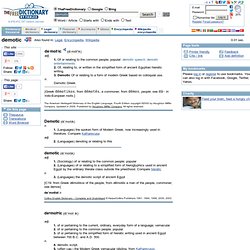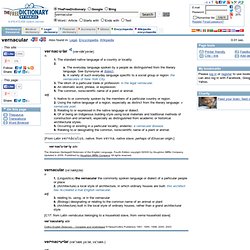

Demotic - definition of demotic by the Free Online Dictionary. The American Heritage® Dictionary of the English Language, Fourth Edition copyright ©2000 by Houghton Mifflin Company.

Updated in 2009. Published by Houghton Mifflin Company. All rights reserved. Demotic (dɪˈmɒtɪk) n 1. Adj 2. Demotic (dɪˈmɒtɪk) 1. 2. 3. [C19: from Greek dēmotikos of the people, from dēmotēs a man of the people, commoner; see demos] deˈmotistn Collins English Dictionary – Complete and Unabridged © HarperCollins Publishers 1991, 1994, 1998, 2000, 2003 de•mot•ic (dɪˈmɒt ɪk) adj. 1. 2. 3.
N. 4. 5. . [1815–25; < Greek dēmotikós popular, plebeian =dēmót(ēs) a plebeian (derivative of dêmos; see demo-) + -ikos-ic] Vernacular - definition of vernacular by the Free Online Dictionary. The American Heritage® Dictionary of the English Language, Fourth Edition copyright ©2000 by Houghton Mifflin Company.

Updated in 2009. Published by Houghton Mifflin Company. All rights reserved. vernacular (vəˈnækjʊlə) n 1. 2. Adj 3. relating to, using, or in the vernacular 4. 5. [C17: from Latin vernāculus belonging to a household slave, from verna household slave] verˈnacularlyadv Collins English Dictionary – Complete and Unabridged © HarperCollins Publishers 1991, 1994, 1998, 2000, 2003 ver•nac•u•lar (vərˈnæk yə lər, vəˈnæk-) Saying - definition of saying by the Free Online Dictionary. Eristic. As a Rhetorical Tool[edit] Eristic was a type of "question-and-answer"[3] teaching tool popularized by the Sophists, such as Euthydemos and Dionysodoros. Students would engage in eristic arguments to learn how to "refute their opponent, no matter whether he [said] yes or no in answer to their initial question"[4] through the practice. Plato believed that the eristic style, "did not constitute a method of argument," believing that to argue eristically is to consciously use fallacious arguments therefore weakening one's position.[5] Unlike Plato, Isocrates (often categorized with the Sophists) conflated eristic with dialectic, making no distinction between the two methods.[6] He did not include the practice of either in his teachings because he felt both lacked "'useful application'...that created responsible citizens.
Philosophical eristic[edit] Schopenhauer considers that only logic pursues truth. Argumentation theory[edit] See also[edit] Notes[edit] Jump up ^ Irwin, T.H.. References[edit] Persuasive business case - MyStart. Developing the Business Case for a Major e-Learning Courseware or Infrastructure Project by Saul Carliner. A business case serves as a prospectus for proposed investment in a costly eLearning courseware project or in technology for learning. A business case provides a structured framework for investigating and reporting the costs and returns of these projects. Specifically, business cases ask learning professionals to provide decision makers with the following information: (1) background of the project, (2) description of alternatives, (3) estimation of project returns, and (4) recommendation of an alternative. Ideally, a business case provides a basis for approval for a project.
If a sponsor still chooses not to approve the project, the business case also provides a framework for determining why. Editor’s Note: Parts of this article may not format well on smartphones and smaller mobile devices. Introduction Some of the projects attempted by learning groups have high price tags, such as complex e-Learning programs and enterprise learning systems (like learning and talent management systems).